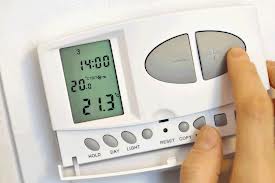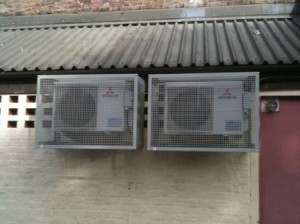If you’re trying to stay cool in summer or warm up in winter, knowing how to set your air conditioning correctly is essential. Whether using a domestic or commercial air conditioning unit, the right temperature keeps you comfortable without driving up your energy bills, and it also helps prevent overuse, which can lead to wear and tear on the system. It’s important to understand how to get the best out of your air conditioning system all year round so you can stay comfortable whatever the conditions.
Why Temperature Settings Matter
Manufacturers design air conditioners to work best within certain temperature ranges. Pushing them too hard, like setting the temperature very low in summer or very high in winter, won’t cool or heat your space any faster. What it does do is increase energy use, create uncomfortable airflow, and strain the system.
Systems that run too hard for too long will invariably malfunction, which will increase the chances of you making a service call to an air conditioning engineer for a repair or replacement, depending on the damage. Choosing the right temperature from the beginning minimises the risk of this happening, and, more importantly, keeps your space feeling comfortable for longer, without causing excess wear on the system.
Best Temperatures for Summer Cooling
UK summers can feel particularly uncomfortable given that homes and offices built here are inherently designed to retain more heat. In summer, it’s important to stay comfortable inside without wasting too much energy. Setting your AC too cold won’t improve comfort any quicker, but it will use more energy, so it’s best to aim for a balanced setting.
There’s no one-size-fits-all answer when it comes to indoor cooling. While 21-22°C is often recommended for a comfortable and efficient setting, preferences can vary. Some may prefer slightly cooler or warmer temperatures depending on the room, the time of day, or personal comfort.
A fan can help improve airflow, and using this alongside an air conditioning system can help disperse cooler air throughout a larger area.
Best Temperatures for Winter Heating
Modern air conditioning systems often serve dual purposes, offering both heating and cooling as part of an integrated HVAC setup. Heat pumps, in particular, are an efficient, eco-friendly alternative to traditional heating.
In winter, a setting around 21°C is generally considered most comfortable, with 20–23°C suitable for most homes and workspaces. Temperatures above 23°C typically lead to unnecessary energy use. A good HVAC system should maintain this range efficiently without running constantly.
How to Set Your AC at Night
Temperatures for sleep should be slightly different from daytime settings. Aim for a cooler, comfortable temperature between 17-19°C using a unit’s built-in sleep mode.
Remember to avoid very cold air directly blowing onto you while sleeping.
Some air conditioning units adjust temperature automatically during the night. If your system has this feature, use it, it keeps things comfortable without running full power all night.
Improving Efficiency and Comfort
Correct temperature settings are just part of the picture. These steps help your system work more effectively:
- Use ceiling or floor fans to circulate air
- Close curtains or blinds during hot days
- Insulate your space to maintain stable temperatures
- Clean or replace filters and accessories
- Avoid blocking vents with furniture
Systems that are maintained regularly are more likely to reach and hold the set temperature efficiently. If yours seems to struggle, an inspection from an air conditioning engineer might be overdue, so you can understand why it isn’t working as it should be.
What If the Room Still Feels Too Hot or Cold?
Sometimes, even with the right air conditioning settings, your space doesn’t feel right. There are a few common causes:
- Dirty filters or poor airflow
- Incorrect unit size for the room
- Low refrigerant levels
- Blocked or poorly placed vents
- Insulation issues
These problems are more common in systems that haven’t been serviced recently. Performance often drops in properties where the system hasn’t been checked before the start of a new season.
Expert Temperature Advice from Air Conditioning Experts
For most homes and businesses, setting your air conditioning to the recommended temperature strikes the right balance between comfort and efficiency. The ranges described above suit the systems Climachill installs and supports.
While it’s tempting to crank the temperature down when it’s boiling hot, or hike it when it’s freezing, don’t overdo the settings and focus on maintaining good airflow and consistent, uniform temperatures. If your unit has a sleep mode, use it to maintain comfort overnight without wasting energy, and remember to check your system if you suspect it’s not performing as well as it should.
To keep your system running smoothly year-round, book a service with Climachill’s experienced team, covering homes and businesses across Sussex.


